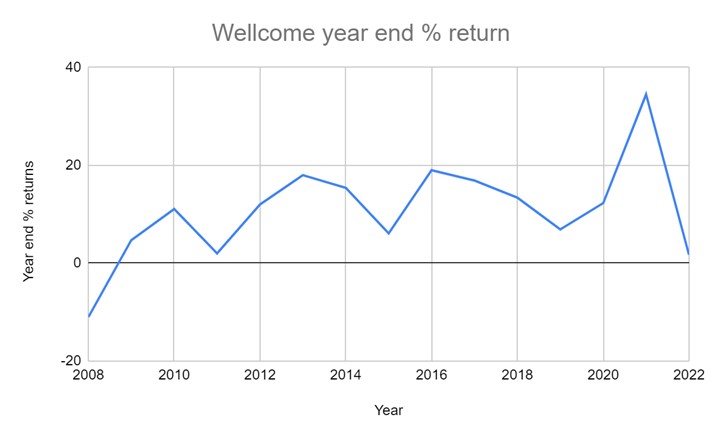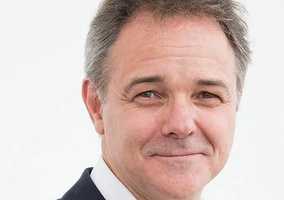Wellcome, the charity with the most investment assets in the UK, has reported its lowest annual return on investments since 2008.
According to its latest annual accounts ending September 2022, the charity recorded a return of 1.7% during the year, or -5.9% after inflation, in what the charity called a “difficult environment”.
This is the smallest level of return Wellcome has made on its assets since the global financial crisis in 2007-08 and compares to 34.5% the previous year.
Since the portfolio was created in 1985, it has provided an average return of 13.8% per year. The charity’s investments have increased by 819% cumulatively over the past 20 years.
The charity ended 2021-22 with net investment assets of £37.8bn, down from £38.2bn the year before.
Meanwhile, Wellcome’s investment portfolio decreased in overall value this year, for the first time since 2011, to £37.8bn.

‘We do not expect things to get any easier in the near term’
Nick Moakes, chief investment officer at Wellcome, has said the grant making charity does not expect this to improve anytime in the near future.
“Although positive in nominal sterling terms, inflation has eroded the real value of our assets. We have been expecting a more difficult world for some time following more than a decade of extraordinary monetary and fiscal support. We do not expect things to get any easier in the near term, he said.
“Our primary focus is therefore to protect long-term value as much as possible while maintaining ample liquidity to fund the mission. We will also look to take advantage of any exceptional opportunities that emerge from the current volatility to underpin future returns. The best investments are often made in the most difficult times."
£16bn to be spent in next decade
Wellcome’s overall expenditure increased by 9% to £1.5bn in 2021-22 while its income rose to £502.3m from £410.3m the year before.
Despite these figures, the grant making giant remains committed to spending £16bn over the next decade on its cause – science and health research.
This spending boost is up from £5bn over the last five years, an increase of 220%.
The money will fund new research that will transform people’s understanding of life, health and wellbeing.
Julia Gillard, chair of Wellcome, told the Financial Times they would increase research spending “even if it means that we are spending down some of the currently held endowment”.
“The best way to look at it is that we are prepared to harvest some of the dividends we had in the earlier and easier economic cycle,” she said.
Wellcome aims to fund work that will combat three key worldwide health challenges: mental health, infectious disease and climate.
The charity will also be announcing new awards for discovery research soon.
Charity ‘rightly’ criticised for lack of progress on anti-racism commitments
In 2020, the funder recognised it had perpetuated racism. An independent investigation conducted last year found there had been “insufficient progress” on anti-racism since.
“Wellcome was rightly criticised this year for lack of progress on our anti-racism commitments,” its accounts read.
The charity plans to recruit an executive staff member to lead on equity, diversity and inclusion and to improve diversity and inclusion in its research.
A quarter of Wellcome’s more than 1,000 employees identified as being from an ethnic minority background in its latest financial year, up from 19% the year before.
However, the charity’s ethnicity pay gap increased to 5.6%m which the charity said is “likely caused by an unusual level of changes to mid-level roles and a high level of recruitment during the organisation redesign”.
Wellcome said the figures must be interpreted cautiously as it has not received ethnicity data from its full workforce.
Related articles











